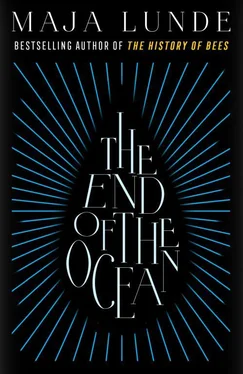“Sure, if you pick the apples.”
“And on the hillside, maybe all the way up in the mountains, we will have a bench and we will sit there when we get old and look at the view.”
“A bench?”
“Yes, I’ll build it myself.”
He imagined us sitting on a bench together when we get old—what a cliché, I thought, and I liked it.
“We will live by the fjord,” he said, “then you can keep Blue there. You can go sailing while I putter in the garden. And pick apples.”
“Nice that you remembered the apples.”
He laughed and then he went on talking about us, that he wanted us to have a progressive distribution of labor, where he wore the apron in the kitchen and I came home with the fish, where he made applesauce. He wouldn’t be angry if I ended up making more money than he did, he said, and was clearly proud of his own generosity: I will allow you to bring home the bigger paycheck.
He talked and talked, had so much to get off his chest. There’s so much I don’t understand, he said, it’s only after we became a couple that I’ve been able to bear thinking about all the things from my childhood that I don’t understand. What do you mean, I asked; there’s so much, he answered, the most obvious, how often I felt the sting of my father’s belt. Even though this was also common in other families we knew, that was no excuse. My mom cried too, she stood in the next room and sobbed, I could hear it through the wall, that’s how loud it was, as if she wanted me to hear that she couldn’t do anything. Even though it was her decision, she encouraged him, he just did what she convinced him he had to do, what fathers were supposed to do. That’s how it was all the time, she was the one who made the big decisions, you know, for him, for me, for all of us, she controlled us, with her hands, the hands she wiped on her apron, with those disapproving sighs and encouraging smiles… or maybe it wasn’t her, after all, maybe it was the expectations they felt the world had of them, but which they actually produced by themselves. It still controls them; they say that they want me to become an engineer, do something more with my life than they have done, because they believe it’s right, the only way. My mother and father, they are so traditional that it burns me up inside, tears me apart, but nonetheless, that’s what keeps them on their feet, I think. They know the rules, they know this game, they know what’s allowed and what is forbidden, and God forbid they should decide to step over the line.
“I feel bad for them,” he once said. “And at the same time, I’m furious with them.”
“Don’t be.”
“Will it make it better if I laugh at them?”
“I don’t know.”
“It would be better if I could laugh. Maybe the objective should be to laugh, do you think? If I can learn to laugh at them, then I will avoid turning out like them? I will be different?”
“You’re already different.”
“Are you sure?”
“You’ve been different ever since the first time I saw you.”
“Or was it you who made me different?”
“…I think we should practice laughing.”
It’s perhaps his laughter that still inhabits me. I can’t get rid of it, the way it rocks inside me, along with the waves.
The boat is still moving, but it’s completely different now, rocking on gentle swells from the storm that has blown over, slowly, back and forth on the weary waves, sliding away.
My boat, Blue , I fell asleep on it. I can’t even manage to sleep with one eye open any longer, my body keeps letting me down, maybe because he is still aching inside me, aching because he let me down.
Because when push came to shove, he wasn’t as good at discerning my needs, at seeing the needs of others, as I’d thought. When push came to shove, he was still just a child of his generation and the belt had made its mark. He wanted to move back to Ringfjorden; he grew tired of Bergen, he said, tired of being required to have an opinion on every street corner, tired of having to take a stand on every issue and that it had better be the “correct” stand. He wanted to move back home, wanted to have a garden, a kitchen, but actually I was the one who would be there, in the kitchen, because the whole time he was searching for the thing in me that had brought us together. He was searching for the girl he could rescue.
Everything else about him was just talk.
He was less daring than our fathers, he took no chances, because actually he was just like all the other young men at that time, with shaggy beards and gentle smiles who pussyfooted their way through life and talked about how everything was going to be different, without meaning it.
The work we took part in, the demonstrations we walked in, the fliers we wrote together—it was just a game for him. I look forward to seeing his eyes when I am standing in front of him with the ice, when I dump it in his yard, the expression on that padded, middle-aged man-about-town face of his, with traces of red wine from the evening before on his lips and his sweet little wife with a forehead just a bit too smooth, and a smile just a bit too tight, and the grandchildren who no doubt will be visiting. Maybe they are the ones who will stomp the ice into the dust, sully it, because it’s their future he is stealing. It is their future his entire generation is stealing… my entire generation has stolen.
Those of us who have only experienced prosperity, never any obstacles.
Yes, perhaps the children should be allowed to do it, because they are the ones he is hurting. But they probably don’t want to, because they don’t care either, the children of today. They are pushed forward by the generations behind them, feel only the absence of any impediment, they don’t care as long as they can have the latest iPhone when they turn seven, and their own large-screen television and an apartment on their twenty-first birthday. They won’t care, they won’t even look at the ice melting on the ground, much less stomp on it, because something else will get their attention, a screen beeping, a phone buzzing. And besides, their feet could get cold.
My head spins.
I need food, I need water.
Finally I get to my feet. I go to fetch a coffee cup, find one in the closet; it’s a mess in there, all the unbreakable dishes have been tossed around and deep inside it is damp—water must have leaked inside here, too. The closet is situated where the deck meets the hull—it can’t be fully watertight there either.
I step on the foot pump for fresh water and muddy water drips into the cup; the water has a faint odor of diesel, like almost everything on board, but I am used to it and drink quickly.
I open the door to the stowage space for dry goods and find a mess in there as well. The lid has fallen off the can of flour and everything is white and damp: bags of powdered soup, canned goods and packages of pasta are covered with sticky flour. I dig out a package of spaghetti and tear off the plastic, can’t bear to wait for the water to boil, can’t bear to look for a pot, but chew some of the hard strands right out of the package, along with a piece of crispbread that has become soft from the moisture.
I eat half the package, find a chocolate bar, too—palm oil, I know it contains palm oil, but bought it anyway, can’t manage without it out here and nobody can see me, I think quickly, but catch myself doing it. Signe, c’mon now, there are limits.
I open the hatch, not knowing what to expect—chaos, the rigging destroyed, the dinghy blown overboard? But everything is as it should be—the rigging, cordage, everything is hanging in its place, as secure as before, the boat has weathered this, held its own, without my doing a thing, and I know it, that long-keel sailboats like this one can withstand a lot, can be knocked down and get back up again. They aren’t like modern boats with deep fin keels, which can lose the keel, be tossed about and capsized. Blue was designed for this, for recovering in a storm.
Читать дальше










